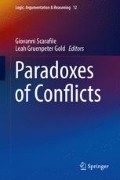Abstract
The adoption of an individualistic perspective on reasoning, choice and decision is a spring of paradoxes of conflicts. Usually the agents immerse in conflicts are drawn or modelled as rational individuals with targets well defined and full capabilities to access to information, without both temporal limitations and perfect reasoning abilities to obtain their preferences are taken account.
However, other models of agent, in the bounded rationality perspective, could help to understand better the interrelationships. I adopt embedded argumentative reasoning processes as satisfying criteria to analyze the expert function in a new socio technical environment that has changed deeply the mechanism and tools to access and to aggregate information. The open access to information and institutional arrangements addressed towards team knowledge could offer other kind of tools to affront the conflict, even its possible benefits.
The “crowd expertise” is emerging as an actual possibility and it must be incorporated to affront with conflicts. The very possibility of obtaining knowledge generated by “many minds”, collective wisdoms, brings up a real challenge to the conservative or elitist conception of the masses, because masses now emerge as a smart collective user, with new mechanisms to select and produce quality knowledge. These new collective actions differ deeply from the traditional modes of social organization. A new mass society is emerging now as a hybrid one that breaks some conceptual traditional models, such as Ortega y Gasset’s ones, and induces a structured way of flourishing both new practices and new knowledge with transforming capabilities.
The language a decision maker uses to verbalize his preferences restricts the set of preferences he may hold(A. Rubinstein 2000: 55).
The diverse many are often smarter than a group of select elites because of the different cognitive tools, perspectives, heuristics, and knowledge they bring to political problem solving and prediction(H. Landemore 2014:184).
Access this chapter
Tax calculation will be finalised at checkout
Purchases are for personal use only
References
Álvarez, J. F. (2002). El tejido de la racionalidad acotada y expresiva (The fabric of bounded and expresive rationality). In M. B. Wrigley (Ed.), Dialogue, language, rationality: A festchrift for Marcelo Dascal (pp. 11–29). Campinas: University of Campinas.
Álvarez, J. F. (2005).Bounded rationality in dialogic interactions. Studies in Communication Sciences: Argumentation in Dialogic Interaction (special issue), 119–130
Álvarez, J. F. (2014a). Notes and slides. International conference paradox and conflicts. http://es.slideshare.net/FALVAREZUNED/presentacion-lecce-end. Accessed 30 Sept 2015.
Álvarez, J. F. (2014b). La irrupción de las masas y la sabiduría colectiva. Investigación y Ciencia, 454, 50–51.
Ariely, D. (2012). The (honest) truth about dishonesty: How we lie to everyone – especially ourselves. New York: Harper Collins.
Dascal, M. (2000). Reputation and refutation: Negotiating merit. In E. Weigand et al. (Eds.), Negotiating and power in dialogic interaction (pp. 3–17). Amsterdam: John Benjamins.
Dascal, M. (2004). Argument, war, and the role of the media in conflicto management. In T. Parfitt & Y. Ergorova (Eds.), Jews, Muslims, and the mass media: Mediating the ‘Other’ (pp. 228–248). London: Routledge Curzon.
Elster, J. (1995). Strategic uses of argument. In K. Arrow et al. (Eds.), Barriers to conflict resolution (pp. 236–257). New York: Norton.
Gigerenzer, R., & Selten, R. (2002). Bounded rationality: The adaptive toolbox. Cambridge MA: The MIT Press.
Landemore, H. (2014). Yes, we can (make it up on volume): Answers to critics. Critical Review, 1–2, 184.
Melamede, Y., & Ariely, D (2015): (Dis)Honesty: The truth about lies. The (Did)Honesty project. http://thedishonestyproject.com/. Accessed 30 Sept 2015.
Mercier, H., & Sperber, D. (2010). Why do human reason? Arguments for an argumentative theory. Behavioral and Brain Sciences, 34, 57–74.
Rainie, L., & Wellman, B. (2012). Networked: The new social operating system. Cambridge MA: MIT Press.
Rheingold, H. (2002). Smart mobs: The next social revolution. Cambridge, MA: Basic Books, Perseus.
Rubinstein, A. (2000). Economics and language. Cambridge: Cambridge University Press.
Sen, A. (1997). Maximization and the act of choice. Econometrica, 65(4), 745–779.
Sperber, D., & Mercier, H. (2012). Reasoning as a social competence. In H. Landemore, & J. Elster (Eds.), Collective wisdom, principles and mechanism (pp. 368–393).
Sperber, D., Clement, F., Heintz, C., Mascaro, O., Mercier, H., Origgi, G., & Wilson, D. (2010). Epistemic vigilance. Mind & Language, 25(4), 359–393.
Wexler, M. N. (2011). Reconfiguring the sociology of the crowd: exploring crowdsourcing. International Journal of Sociology and Social Policy, 31, 6–20.
Author information
Authors and Affiliations
Corresponding author
Editor information
Editors and Affiliations
Rights and permissions
Copyright information
© 2016 Springer International Publishing Switzerland
About this chapter
Cite this chapter
Álvarez, J.F. (2016). Conflicts, Bounded Rationality and Collective Wisdom in a Networked Society. In: Scarafile, G., Gruenpeter Gold, L. (eds) Paradoxes of Conflicts. Logic, Argumentation & Reasoning, vol 12. Springer, Cham. https://doi.org/10.1007/978-3-319-41978-7_7
Download citation
DOI: https://doi.org/10.1007/978-3-319-41978-7_7
Published:
Publisher Name: Springer, Cham
Print ISBN: 978-3-319-41976-3
Online ISBN: 978-3-319-41978-7
eBook Packages: Religion and PhilosophyPhilosophy and Religion (R0)

